A referendum that took place on Thursday determined that the UK would leave the European Union.
The motion to leave won by 52% to 48%. In England, leave won by 53.4% to 46.6%; in Wales, leave won by 52.5% to 47.5%. Scotland and Northern Ireland both voted to remain I the European Union.
The European Union is a partnership, economic and political, which includes 28 European countries. It was established after World War Two to nurture economic cooperation. The purpose of the union was for countries to trade together to avoid war with each other. Since then, the union has evolved to become a “single market,” in which goods and people circulate as if the states were one country. 19 countries in the EU use the euro as their form of currency; the EU also has its own parliament which sets rules on the environment, transportation, and consumer rights, among other things.
Brexit has become a way of saying the UK leaving the EU. The term was coined by joining the words “Britain” and “exit” to get Brexit.
In order for the UK to leave the EU, it needs to reach an agreement called Article 50 of the Lisbon Treaty. David Cameron, or his successor, must decide when to activate this. After the article is invoked, the legal process of withdrawing from the EU will begin and the UK will have two years to negotiate its withdrawal. The article has been in place since 2009, and it has not been tested, so it is uncertain how the Brexit process will go. EU law still applies in the UK until it is no longer a member; the UK will continue to follow EU treaties and laws, but it cannot participate in decision-making.
Many people are concerned about the status of their jobs as UK citizens working in the EU. The status of their jobs could remain within single market depending on how the UK and the EU work out their agreement. If single market remains, free movement rights would allow UK citizens to work in the UE, however, if the government sets work permit restrictions in place, other countries would follow suit, making members of the UK have to apply for visas to work.
Those who wanted the UK to leave the EU said that Britain was being held back by the EU as they placed too many rules on business and charged billions of pounds a year in membership fees. They also wanted Britain to have full control of its borders and reduce the number of people who enter the country to live and/or to work, taking on an immigration stance. The Leave campaign opposed the EU’s principle of “free movement,” in which no visa is necessary to go and live in another EU country.
Prime Minister David Cameron pursued an agreement with other leaders of the European Union to change the terms of the UK’s membership. He was in favor of Britain staying in the EU. The deal would allow Britain to have a “special” status and avoid some things British people dislike about the EU, such as high levels of immigration.
“I will do everything I can as Prime Minister to steady the ship over the coming weeks and months but I do not think it would be right for me to try to be the captain that steers our country to its next destination.”
The FTSE100 dropped 500 points in 10 minutes after opening this morning. This reduction indicates that France has replaced Britain as the world’s fifth biggest economy. The price of the pound against the dollar plummeted overnight
Britain’s decision to leave the EU has drawn attention to campaigns in other European countries for them to hold referendums on membership. France, Italy, and the Netherlands have also declared movements calling for a vote.
EU president Donald Tusk stated he is trying to hold the European Union together.
“We are determined to keep our unity as 27…I will propose that we start a period of wider reflection on the future of our union.”
